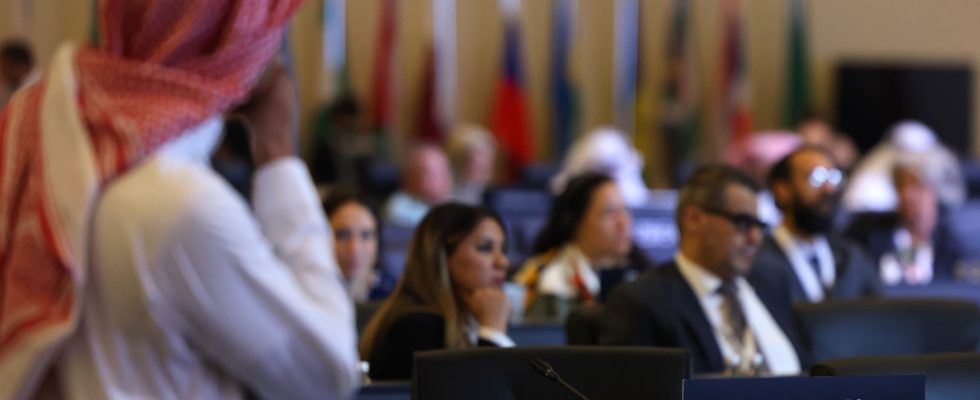Monday August 28, an Air Seychelles plane bound for Tel Aviv had to make an emergency landing at Jeddah airport, in Saudi Arabia. The plane experienced electrical problems and the pilot refused to continue towards the Israeli airport, 1,500 kilometers away. On board, 128 citizens of Israel, a country with which Riyadh does not maintain diplomatic relations. “We were very scared at first, but they were charming, very smiling,” one of the passengers told Israeli radio upon her arrival in Tel Aviv. The next day, Prime Minister Netanyahu posted a video on his X account (formerly Twitter) to thank the Saudi authorities for their “warm attitude” and to congratulate himself on the “good neighborly” relationship between the two countries.
Normalization with Israel, a subject still explosive in the Arab world
The media coverage generated by this banal mechanical breakdown illustrates the importance of the Saudi issue for Israel. For many months, the Jewish State has been negotiating the normalization of its relations with the Arab giant, through the United States. “Israel has a clear interest in strengthening and publicizing its ties with Saudi Arabia,” says Yoel Guzansky, a specialist on the subject at the Institute for National Security Studies (INSS), a research center based in Tel Aviv. It is believed that an agreement with Saudi Arabia would give other countries in the Muslim and Arab world greater, if not absolute, legitimacy to establish ties with Israel.”
However, the subject remains explosive in the Arab world. At the end of August, the brief meeting in Rome between the Libyan Minister of Foreign Affairs and her Israeli counterpart inflamed Tripoli and caused the dismissal and flight of the head of diplomacy abroad.
Imminent for some, improbable for others, the Israeli-Saudi rapprochement gives rise to all kinds of contradictory predictions, but the diplomatic activity of recent weeks seems to confirm the thesis of normalization in progress. On September 5, American and Palestinian delegations met in Riyadh to discuss this possibility. And, on September 11, Saudi Arabia officially welcomed an Israeli delegation for a UNESCO summit… Throughout the summer, the American Secretary of State, Antony Blinken, increased his contacts to move the issue forward. “The Biden administration is engaged in the Abraham Accords process and is aiming for the big prize: the normalization agreement with Saudi Arabia. However, the path to this objective is paved with challenges,” notes Joe Macaron, analyst at the Wilson Center, a think tank based in Washington.
What consequences for the Palestinians?
The main concern of the Saudis is to give assurances to the Palestinians. The latter have difficulty understanding this rapprochement, even though Israel is intensifying colonization in the West Bank and resolutely turning its back on a negotiated solution. Under pressure from Saudi conservatives, Crown Prince Mohammed bin Salman (MBS) is trying to keep up appearances. On August 12, the Saudi ambassador in Amman, Jordan, presented his credentials as ambassador to the Palestinian Authority and as consul general of Jerusalem. In addition, MBS is proposing to finance a substantial investment plan in the West Bank. “Ben Salman took the first step towards the Palestinians,” notes Ibrahim Dalalsha, a political analyst based in Ramallah, who specifies that the Saudis inform the Palestinians of the discussions underway in Washington. “For the moment, neither the Palestinian Authority nor Hamas have condemned the Saudi consultations around normalization with Israel,” he notes.
With an agreement of this type, Riyadh would abandon its own peace initiative. Presented in 2002, it made the formation of a Palestinian state, with East Jerusalem as its capital, a prerequisite for diplomatic relations between Israel and Arab countries. “We do not want funding, but concrete steps to stop colonization,” warns Bassam Khoury, former minister of the Palestinian Authority.
On this point, the current Israeli government shows little inclination to compromise. “We will give in much less than you think,” Benjamin Netanyahu said on August 7 on Bloomberg TV. Religious nationalists, essential to the ruling coalition, have warned that they will oppose any territorial concessions in favor of the Palestinians. On the other hand, Israeli security officials are willing to accept the civilian nuclear program demanded by Riyadh in exchange for normalization. The two countries do not harbor any dispute and even make their common hostility to Iran the main motivation for this rapprochement.
“We are not talking about normalization, but about an integrated Middle East, unified like Europe. We are all sovereign states, but we share common interests,” the Saudi ambassador to the United States recently summarized, Reema bint Bandar al-Saud. Words that were inconceivable just three years ago.
